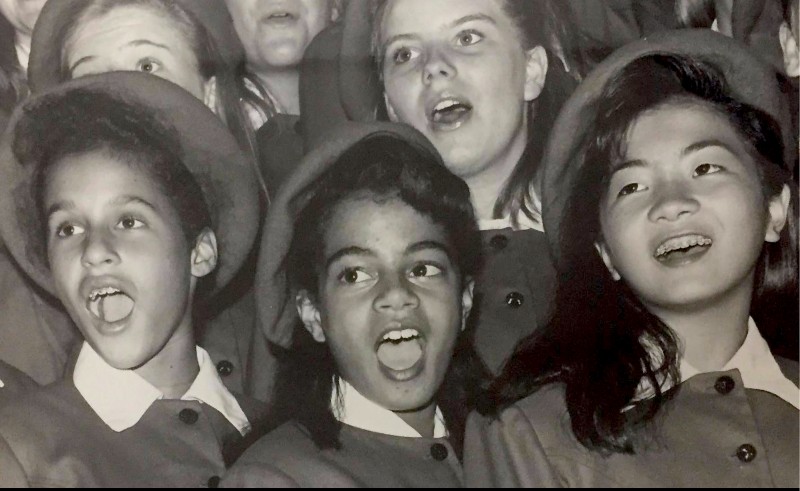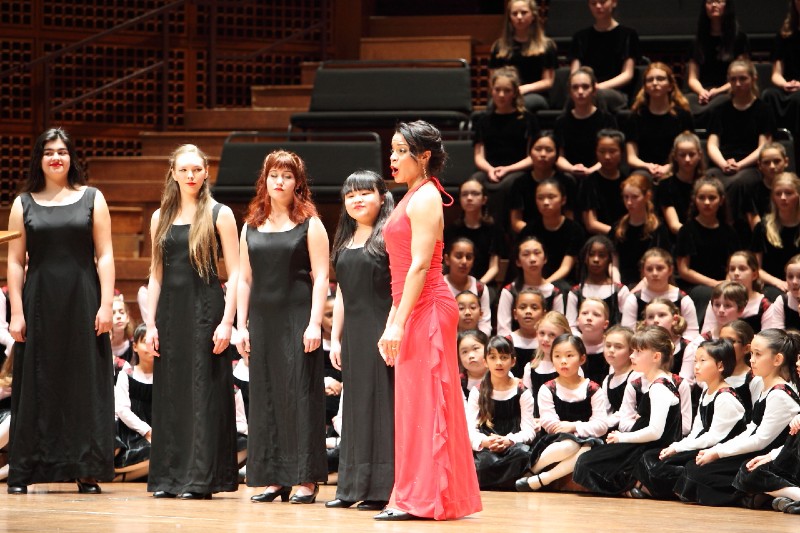Open Gates Conversations
Conversations Header
Conversations with our Co-Founders, Joe Chappel and Michele Kennedy
Conversations #2
#2 (July 15, 2021)
Notes from Michele Elizabeth Kennedy
 Performing with the San Francisco Girls Chorus Premier Ensemble, 1991Growing up as a shy and ambitious girl in Oakland, CA, I grew over time to embrace two central passions: making music in community, and working toward social justice.
Performing with the San Francisco Girls Chorus Premier Ensemble, 1991Growing up as a shy and ambitious girl in Oakland, CA, I grew over time to embrace two central passions: making music in community, and working toward social justice.
My first exposure to music was hearing my grandfather play Bach on the piano as a little girl. He played every morning, and I was mesmerized by the sound. Luckily, that wasn’t lost on him! He gave my family an upright Yamaha piano, and I began taking piano lessons at age 3.
It wasn’t long after that, that my parents discovered my love of singing. Truth be told, when I was supposed to be practicing the piano, I’d often end up singing instead! So it was, that at age 8, I joined the San Francisco Girls Chorus and found myself in the midst of a rich musical family that would help to launch my professional life. And it was the Girls Chorus’ emphasis on early music that would later form the bedrock of my career.
With service oriented parents – my mother, a lifelong social worker and health access advocate, and my father, an engineer and devoted educator – I also developed a love of justice work and began to pursue it in middle school. Every week I would volunteer in Berkeley at Global Exchange, a human rights nonprofit that promotes fair trade and just wages for craftworkers across the world.
As a teenager, I always viewed these two parts of myself as separate: the musician and the advocate. This work – and duality – continued in my collegiate studies at Yale University, where I double-majored in Music and Political Science. I loved the balance that I found across those disciplines and different ways of exercising my brain. The height of it was in my senior thesis statements: one paper about feminism in two beloved Mozart operas, and the other about the global impact of fair trade coffee, small-scale farming, and workers’ rights in Costa Rica.
 Guest Soloist with the SFGC, Davies Symphony Hall, Christmas 2018It wasn’t until I’d graduated from college and moved to New York City that I began to wonder: could these two parts of myself find some way to work together? How could I find an outlet for my joint passions that would somehow satisfy both callings?
Guest Soloist with the SFGC, Davies Symphony Hall, Christmas 2018It wasn’t until I’d graduated from college and moved to New York City that I began to wonder: could these two parts of myself find some way to work together? How could I find an outlet for my joint passions that would somehow satisfy both callings?
Enter the Open Gates Project. In all of my years as a performer specializing in historic repertoire and the oratorio, I had not before found a concert series with a mission like this one: to center the voices of musicians of color with an equal emphasis on artistic excellence and inclusion. The power of that mission strikes a deep chord within me. It dispels the myth that I need to keep my dual callings separate; on the contrary, when they are combined, the power of each calling is magnified into a much wider impact.
It is that impact that I wish to celebrate with you today. We are building our foundation for OGP, and we need your voice at the table. We are calling on our allies and supporters from NYC and beyond to rally behind this trailblazing effort and the generations of hard work that it seeks to honor and advance.
To that end, please join us in spreading the word about Open Gates. Thank you in advance for helping with this essential work!
— Michele Kennedy
Read a related blog post by Michele "Postcard to the SFGC Community"
Conversations #1
#1 (April 29, 2021)
A few years back, in the “before” times, as we jokingly refer to the pre-lockdown years, Gene Murrow, executive director of Gotham Early Music Scene, reached out to me one day to invite me to lunch. Gene and I have known each other for many years through our mutual involvement with the Early Music scene in New York, so I didn’t hesitate at accepting a chance to catch up with a dear old friend. There would be much to discuss.
When we finally met, there was plenty of laughter and reminiscing, but the conversation quickly turned to more serious matters. You see, Gene and I had maintained contact over the years, through our presence on social media. And it was through this online friendship that we discovered our shared interest in politics and issues around social justice. As we sat in the august dining room of one of those Ivy League alumni clubs in midtown Manhattan, we started to talk about our industry and how many of the problems of the world had found their way even onto our stages and seeped into the culture of many of our beloved arts organizations. What were some of our biggest structural challenges? Where did inequity for artists of color begin?
I remember pointing out that for me, the gatekeepers were a very large part of the problem. The gatekeepers is the name we give to those who hold the power in auditions, boardrooms, artist management and other important hurdles artists must navigate to advance a career. They decide which artists receive the investment of time, money, and promotion . Their imprimatur can mean the difference between a truly ascendant career arc or one that plateaus indefinitely. Gatekeepers, like the rest of us, bring their own bias and prejudices to their decision-making and this is often reflected in whom we do and don’t see on the stage.
After our lovely lunch and much discussion, I thought of our conversation as just that – a lovely and talkative one-time-get-together. However, in the early days of the pandemic, Gene reached out to me again with a proposal. What if we turned our conversation into action? What if we started a concert series focused on presenting artists of color and also bringing the beauty of Early Music to new and underrepresented audiences? And would I be interested in co-curating with Michele Kennedy? The answer to all those questions was obviously a resounding “YES!”
One of the first tasks for our new venture was thinking of a name, and while we came up with more than a few good ones, The Open Gates Project (OGP) took an early and decisive lead. It just made sense, in light of our conversations and the genesis of this concert series. The imagery of an open gate connotes access and an open dialogue that we want to always encourage. Michele and I will constantly ask you to join us in our ongoing conversation about the nexus of music, equity, race, social justice, and so much more. The conversation is meaningless if we don’t hear from you. And this is a conversation that has been going on for a very long time when you consider artists like Paul Robeson, Marian Anderson, Leonard Bernstein, Bartok, Britten and many others from all musical periods.
Speaking of conversations, please enjoy the short video below of Pat Neeley and Dongmyung Ahn. It is a beautiful musical conversation from Rosenmuller’s Sonata Terza. Dongmyung and Pat are two artists who will be joining OGP for our inaugural concert this fall.
Remember, the invitation to participate in the OGP dialogue is open and permanent. We want to hear from you!
— Joe Chappel

